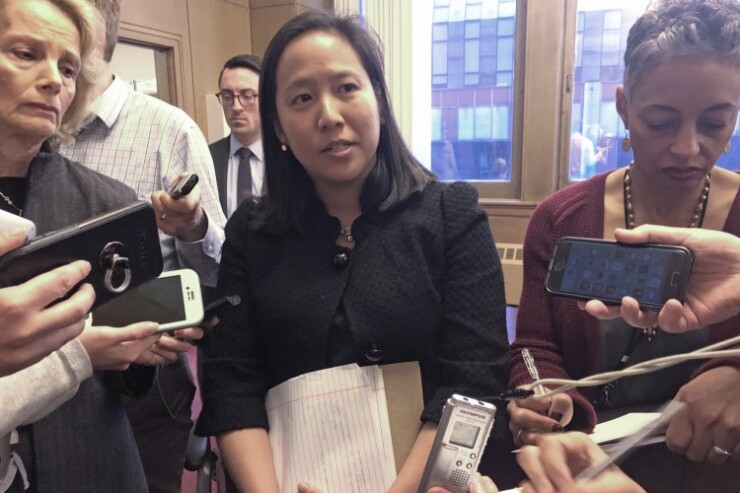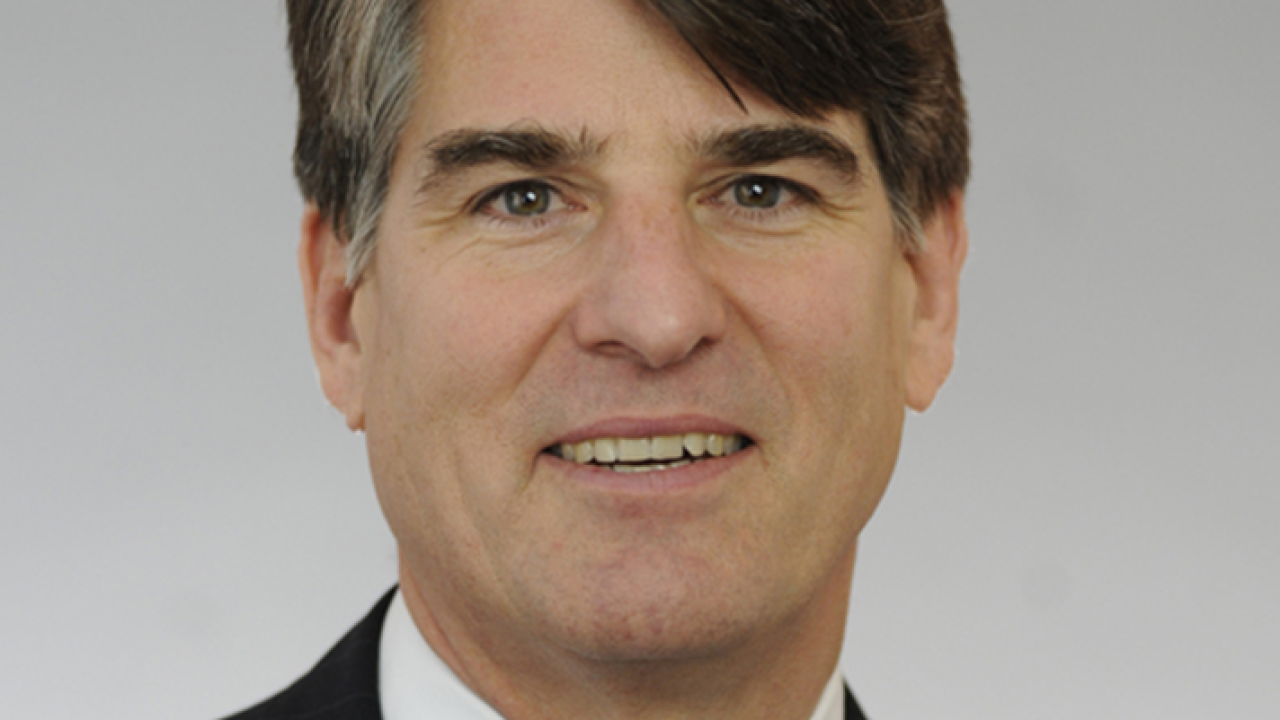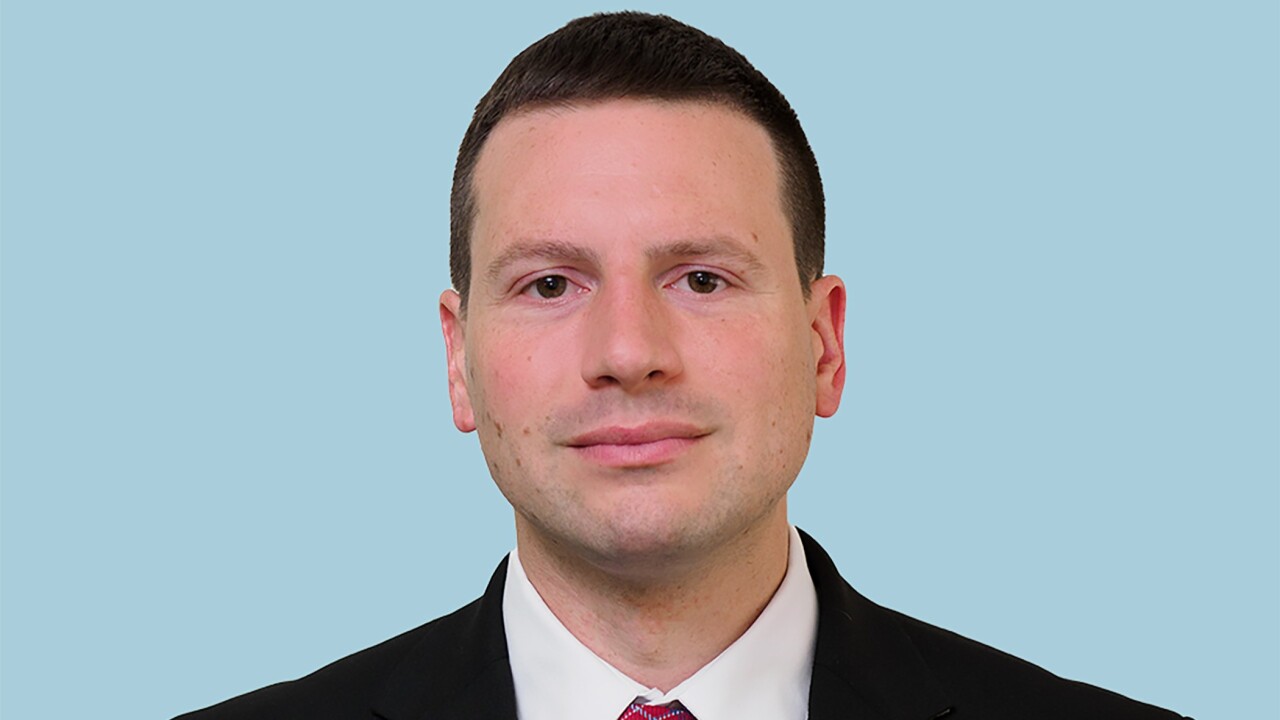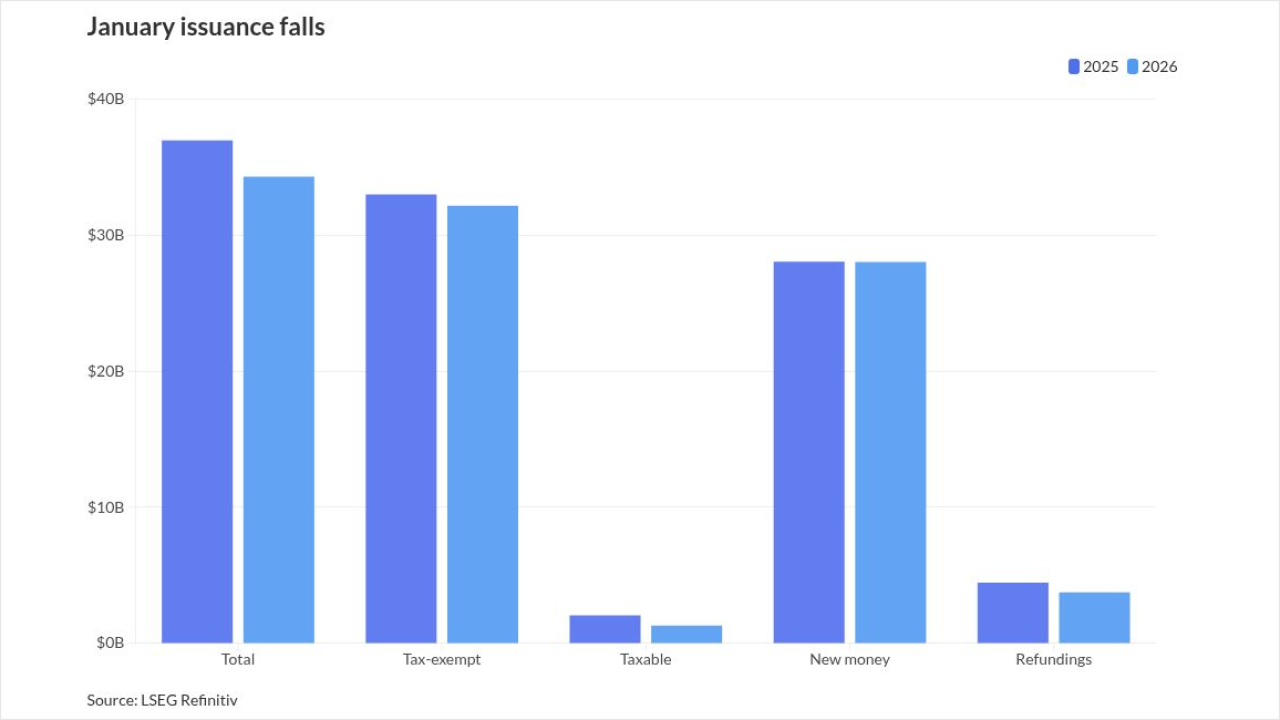Chicago conducted a full court press with investors Thursday to assure them that the COVID-19 pandemic hasn’t pushed the city's efforts to reach structural balance and fixing its pension quagmire to the backburner.
Mayor Lori Lightfoot stressed the city’s commitment to protect reserves and use a portion of its $1.9 billion from the federal American Rescue Plan to cancel $950 million of

“First and foremost we need to make sure that we address our structural deficit” with the federal coronavirus relief funds, Lightfoot said in a discussion with Chief Financial Officer Jennie Huang Bennett at the city’s online investors’ conference.
“We had to do some one-timers to close the budget gap for 2021 because we didn’t know whether there would actually be any other [federal] monies available,” Lightfoot said. “I’m looking to eliminate some of those one-timers and use the ARP to do that. If we hadn’t seen the COVID meltdown we’d be talking about a budget surplus. I feel optimistic that we will get back there.”
The city planned to build $450 million of debt restructuring for 2020 relief and $500 million for 2021 into a refunding/restructuring deal this year. To buy time for new federal relief to come through, the city took out a credit line with JPMorgan to cover the $450 million with plans to roll it into a long-term deal if federal aid fell through.
The city intends to pay off the line in early summer after receiving the first of two rounds of ARP funding, Bennett said. Lightfoot will need the City Council to sign off on eliminating the budget changes to cancel the scoop-and-toss. The administration is banking on convincing council members who are clamoring for more spending to go along with the plan by using other ARP funds for social investments.
A 2023 date for structural balance “is still the target although we are still working through our ARP funds and how it is we are going to apply those funds in terms of balancing financial sustainability and overall economic recovery,” Bennett said. Chicago is fortunate to have received federal relief, she said, “which does buy us a longer bridge to our path in terms of mapping our path there.”
The biggest challenge
Lightfoot addressed the city's crime rates and its contentious relationship with the Chicago Teachers’ Union — issues that investors fear may constrain the city's tax base. But it’s the city’s $31.8 billion of net pension liabilities that pose the most daunting post-pandemic strain.
“I think the biggest challenge we face is pensions…so we have to continue to really force the conversation” with the state and labor, Lightfoot said.
The city’s four pension funds range from 18% to 42% funded. Former Mayor Rahm Emanuel won state approval to move the funds from a statutorily based contribution method that allowed liabilities to mount to one that ramped up to actuarially-based payments with the goal of reaching a 90% funded target in 40 years.
The ARC funding requirement hit last year for police and firefighters and hits for the municipal and laborers’ fund in 2022 when contributions will jump to $2.25 billion from $1.815 billion this year. Increases then level off to about 2%.
Gov. J.B. Pritzker’s
“Unfortunately, this is classic. It's an unfunded mandate” because the legislation wasn’t accompanied by a means to cover the cost, Lightfoot said in response to an investor question.
"Springfield can't keep doing this to us," she said, naming the state capital. "They have to listen to us. We are suffering and challenged economically the same as the state is. “We can't keep shouldering the burden of unfunded mandates.”
Lightfoot had previously pitched a state takeover of the city's pensions, but Pritzker shot that down.
“It’s my hope that everybody involved will get serious and come to the table. What we’ve have been lacking is a political will,” Lightfoot said, calling the system “unsustainable.”
In some good news, the funds all closed out the year with investment earnings that recovered from the pandemic’s early blows and exceeded assumed return rates with police at 10.6%, fire at 12.3%, municipal at 10% and laborers’ at 15.5%, the city said.
Lightfoot sought to highlight a greater fiscal commitment to neighborhood investments and improved police relationships with the public that have raised homicide clearance rates into the 60% range compared to the teens a few years ago. Lightfoot blamed rising crime on the pandemic and sought to cast it as an urban issue nationally.
“We are facing not just an unprecedented uptick of violence,” Lightfoot said. “We are all struggling with some of the same issues.”
Asked by an institutional investor about whether she worries that the city’s contentious relationship with the teachers’ union impedes population growth, Lightfoot said there’s “no question this conflict is not helpful” but said the city can boast of top high schools and improving academics. The union and CPS battled over reopening plans and in 2019 walked out over a new contract.
With the city’s population currently around 2.7 million, Lightfoot repeated her goal to try to return to 3 million.
Borrowing timeline
The city intends use a not-yet-determined interim financing product this quarter to raise $500 million for capital projects under a five-year, $3.7 billion capital program. The city intends to spend $1.56 billion in 2021 and 2022.
The city would take out the interim financing in a GO sale slated for late this year or early next year and that deal may include refundings and some additional amount if more capital funds are needed, Bennett said in an interview Friday. About $450 of GOs can be currently refunded this year and early next year. Overall borrowing for the capital program could shift depending on the final form President Biden’s infrastructure plan takes and what passes.
The city plans an interim financing for O’Hare International Airport projects in the second or third quarter and would wrap that debt into a long-term bond sale slated for early next year. A refunding of Sales Tax Securitization Corp. bonds is planned for the fourth quarter and a mix of new money and refunding water and sewer revenue bonds is planned in the first or second quarter of next year.
The City Council signed off last November on $3.9 billion of new money, refunding and restructuring bonding authority as part of the
The city’s GOs carry a BBB-minus from Fitch Ratings, an A from Kroll Bond Rating Agency, a junk level rating of Ba1 from Moody’s Investors Service, and BBB-plus from S&P Global Ratings, all with negative outlooks.
The city is not currently considering borrowing in advance of the casino’s opening and pension obligation bonds remain on the table as a “useful tool” but only if the city is able to adopt funding changes that would need a sign off by labor and the state to justify a borrowing to rating agencies and investors, Bennett said Friday.
Success Touted
“We have maintained the city’s credit ratings throughout this crisis and a very difficult couple of years. We’ve maintained our reserves and climbed the pension ramp,” Bennett said. Reserves total about $1 billion or 24% of the $4 billion annual corporate fund. The city tapped about $30 million in 2021.
Once the city identifies how it will use the ARP funds and secures city council approval, Bennett hopes rating agencies will be convinced to move the city’s outlook to stable. “They are very interested in how we use those dollars,” Bennett said.

Once the city finishes the ARC ramp on pensions in 2022 “we believe that will be a significant improvement to the overall financial situation of the budget” given reserves will also remain intact, Bennett said.
Lightfoot boasted that Chicago received 31 corporate relocations last year. Revenues are tracking on budget at $434 million so far this year compared to $431 million budgeted.
The city expects some of its harder hit revenues to pick up more quickly as the city and reopens. Pritzker announced Thursday that COVID metrics had improved enough to allow the state to move into a ‘bridge’ phase to a full lifting of capacity restraints in June. Lightfoot said earlier this week she expects to reopen fully by early July.
The use of structural fixes more than matched the 2021 budget’s structural imbalance.
The $1.2 billion 2021 gap stemmed from an $800 million pandemic tax blow and $400 million of growing structural costs. The city erased the deficit with $547 million of structural fixes. That included a $94 million property tax hike with future annual raises now in place tied to inflation that should generate $30 million annually.
In addition to the $500 million of debt restructuring, the budget relied on $141 million of one time fixes. They won't be replaced with ARP funds.
Over the long term, the city hopes to gain revenue from a planned casino. Officials recently issued a
The estimated $200 million in annual revenue from a casino would go to fund public safety pensions. The Joliet contract carries a long-term value of $1 billion and lays the groundwork for other cities struggling with groundwater supplies to join the Chicago system.
A record 375 investors participated in Thursday’s online conference and the city will hold one-on-one calls if requested, Bennett said. Its in-person conferences were held in the late summer or early fall but the city delayed the conference last due to the pandemic.
Financial managers at the city’s sister agencies, water department, and airports also provided updates.
Chicago and agencies that have their own borrowing authority — the Chicago Park District, Chicago Public Schools, City Colleges Chicago and Chicago Transit Authority — will receive a total of $6.5 billion of ARP funds. They stressed that they will spend ARP money on non-recurring investments so as not to create structural gaps.





